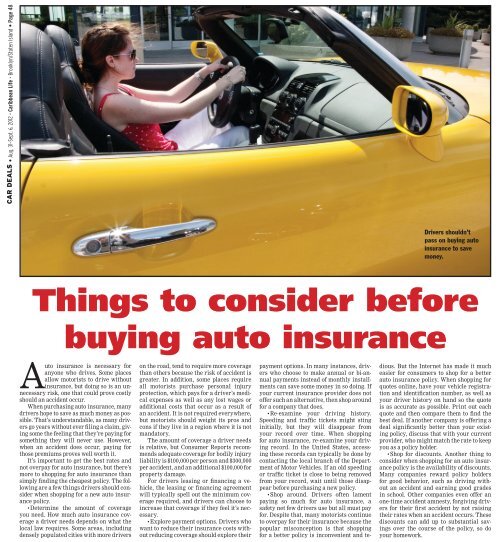Brooklyn print edition (PDF) - Caribbean Life
Brooklyn print edition (PDF) - Caribbean Life
Brooklyn print edition (PDF) - Caribbean Life
Create successful ePaper yourself
Turn your PDF publications into a flip-book with our unique Google optimized e-Paper software.
CAR DEALS Aug. 31–Sept. 6, 2012 • <strong>Caribbean</strong> <strong>Life</strong> • <strong>Brooklyn</strong>/Staten Island Page 48<br />
Things to consider before<br />
buying auto insurance<br />
Auto insurance is necessary for<br />
anyone who drives. Some places<br />
allow motorists to drive without<br />
insurance, but doing so is an unnecessary<br />
risk, one that could prove costly<br />
should an accident occur.<br />
When purchasing auto insurance, many<br />
drivers hope to save as much money as possible.<br />
That’s understandable, as many drivers<br />
go years without ever fi ling a claim, giving<br />
some the feeling that they’re paying for<br />
something they will never use. However,<br />
when an accident does occur, paying for<br />
those premiums proves well worth it.<br />
It’s important to get the best rates and<br />
not overpay for auto insurance, but there’s<br />
more to shopping for auto insurance than<br />
simply fi nding the cheapest policy. The following<br />
are a few things drivers should consider<br />
when shopping for a new auto insurance<br />
policy.<br />
• Determine the amount of coverage<br />
you need. How much auto insurance coverage<br />
a driver needs depends on what the<br />
local law requires. Some areas, including<br />
densely populated cities with more drivers<br />
on the road, tend to require more coverage<br />
than others because the risk of accident is<br />
greater. In addition, some places require<br />
all motorists purchase personal injury<br />
protection, which pays for a driver’s medical<br />
expenses as well as any lost wages or<br />
additional costs that occur as a result of<br />
an accident. It is not required everywhere,<br />
but motorists should weight its pros and<br />
cons if they live in a region where it is not<br />
mandatory.<br />
The amount of coverage a driver needs<br />
is relative, but Consumer Reports recommends<br />
adequate coverage for bodily injury<br />
liability is $100,000 per person and $300,000<br />
per accident, and an additional $100,000 for<br />
property damage.<br />
For drivers leasing or fi nancing a vehicle,<br />
the leasing or fi nancing agreement<br />
will typically spell out the minimum coverage<br />
required, and drivers can choose to<br />
increase that coverage if they feel it’s necessary.<br />
• Explore payment options. Drivers who<br />
want to reduce their insurance costs without<br />
reducing coverage should explore their<br />
payment options. In many instances, drivers<br />
who choose to make annual or bi-annual<br />
payments instead of monthly installments<br />
can save some money in so doing. If<br />
your current insurance provider does not<br />
offer such an alternative, then shop around<br />
for a company that does.<br />
• Re-examine your driving history.<br />
Speeding and traffi c tickets might sting<br />
initially, but they will disappear from<br />
your record over time. When shopping<br />
for auto insurance, re-examine your driving<br />
record. In the United States, accessing<br />
these records can typically be done by<br />
contacting the local branch of the Department<br />
of Motor Vehicles. If an old speeding<br />
or traffi c ticket is close to being removed<br />
from your record, wait until those disappear<br />
before purchasing a new policy.<br />
• Shop around. Drivers often lament<br />
paying so much for auto insurance, a<br />
safety net few drivers use but all must pay<br />
for. Despite that, many motorists continue<br />
to overpay for their insurance because the<br />
popular misconception is that shopping<br />
for a better policy is inconvenient and te-<br />
Drivers shouldn’t<br />
pass on buying auto<br />
insurance to save<br />
money.<br />
dious. But the Internet has made it much<br />
easier for consumers to shop for a better<br />
auto insurance policy. When shopping for<br />
quotes online, have your vehicle registration<br />
and identifi cation number, as well as<br />
your driver history on hand so the quote<br />
is as accurate as possible. Print out each<br />
quote and then compare them to fi nd the<br />
best deal. If another company is offering a<br />
deal signifi cantly better than your existing<br />
policy, discuss that with your current<br />
provider, who might match the rate to keep<br />
you as a policy holder.<br />
• Shop for discounts. Another thing to<br />
consider when shopping for an auto insurance<br />
policy is the availability of discounts.<br />
Many companies reward policy holders<br />
for good behavior, such as driving without<br />
an accident and earning good grades<br />
in school. Other companies even offer an<br />
one-time accident amnesty, forgiving drivers<br />
for their fi rst accident by not raising<br />
their rates when an accident occurs. These<br />
discounts can add up to substantial savings<br />
over the course of the policy, so do<br />
your homework.









